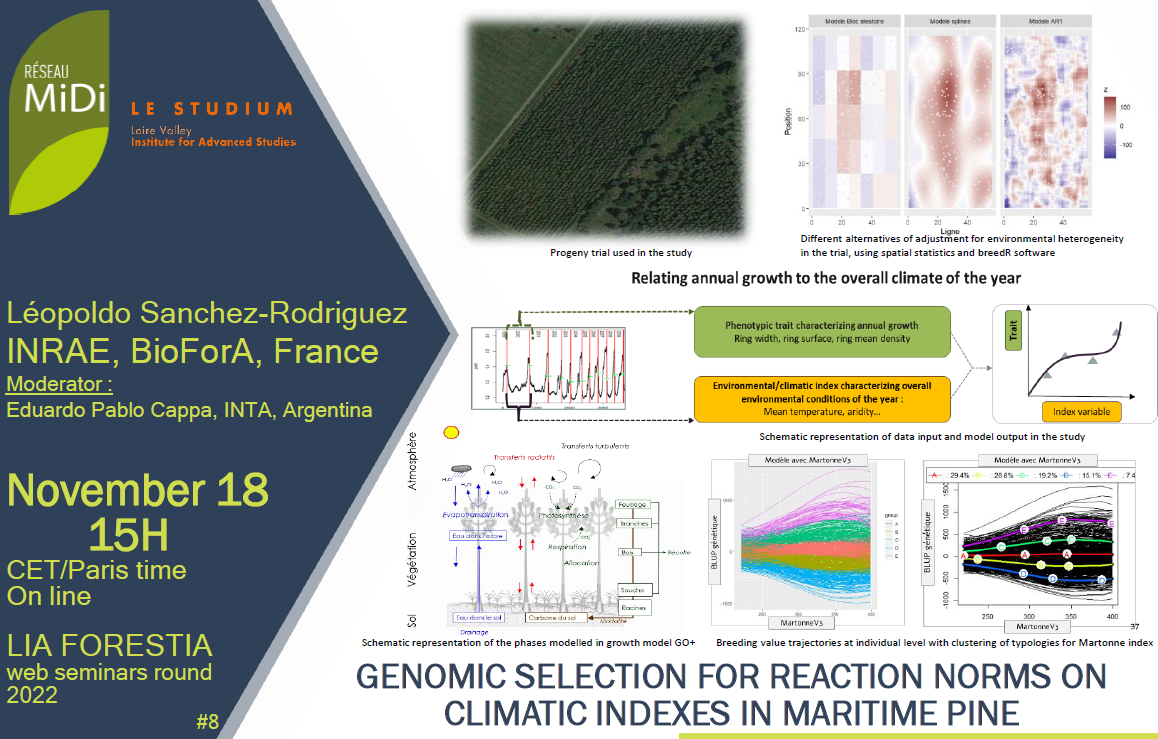Round of FORESTIA web seminars
SEMINAR # 8
« Genomic selection for reaction norms on climatic indexes in maritime pine »
Léopoldo Sanchez-Rodriguez
INRAE, BioForA, France
November 18 at 15h (CET/Paris time)
The International Associated Laboratory FORESTIA starts in 2022 a new round of short seminars aimed at stimulating the scientific comunication among its members, as well as between them and other international laboratories.
These seminars are a new opportunity for the FORESTIA scientists to present and discuss their objectives, research work and results on adaptation of forest ecosystems to global changes.
Seminar #8 by Léopoldo Sanchez-Rodriguez, INRAE, BioForA, France
Abstract
A new proof-of-concept study for genomic selection (GS) in maritime pine is presented here with two major steps forward compared to previous case studies of GS in the species: a greater number of informative markers and the focus on wood related phenotypic plasticity traits. The main objective of this study was to combine genomic, phenotypic and environmental data in order to build GS models for norms of reaction (NoR) to climatic indexes.
The GS population is composed of 650 trees from 25 half-sib families established on two contrasted sites (dry vs. humid site) in 1996. These progenies are representative of the second generation of the breeding program of the species in France. The 650 trees were genotyped with the 4TREES Axiom array developed within the B4EST project. Wood related phenotypic records were obtained from X-rayed increment cores collected on all trees, and phenotypes related to each ring (from 1999 to 2019) were extracted, namely: ring width, ring surface, ring density and several other variables describing the within-ring variability.
Two kinds of climatic indexes were used, a classic and simple Martonne aridity index combining temperature and rainfall, and a complex ecophysiological growth model (GO+) able to predict water availability at a very fine scale. The outputs of both models were summarized at annual levels to be used as alternative climatic covariables for ring traits. GS was modelled following different cross-validation scenarios representing operational schemes in the breeding program, and compared to current evaluation system using exclusively pedigree information. Modelling with the climatic indexes as covariables was obtained by a random regression approach, which offered the possibility to predict genetic and genomic breeding value trajectories at individual level over the environmental gradients represented by the sample of years of growth.
Results showed the advantages of GS over the pedigree counterparts in prediction quality over the ranges in the two climatic indexes. The more complex GO+ model provided the best performance overall. Individual trajectories made of breeding values were easily clustered by their shapes over the climatic indexes, with typologies of trajectories showing systematic advantage in growth over the whole range of environments compared to the other less performing NoR typologies. The driest extremes produced less variation among individual trajectories than that observed for the wettest extremes. The wettest range of the cline resulted in large discrimination among individual trajectories. A similar modeling work was done using outputs from a resistograph, with faster a cheaper operational setting.
Results are discussed in the context of breeding of maritime pine facing global changes, with propositions in terms of GS implementation, the strategic use of NoR on climatic indexes, and the choices of partial or cheap phenotyping among candidates to selection.
> > Video recording available : Here !
>> Next seminar on december 16th by Ricardo Villalba, CONICET, Argentina.
MiDi is a interdisciplinary Research Thematic Network, focused on biodiversity and habitats and funded by the Centre-Val de Loire Region. The network aims to promote studies in multiple fields of BioGeoSciences and Human and Social Sciences in relation to global changes.
This conference is organised in partnership with the Le Studium (Institute for Advanced Studies).


